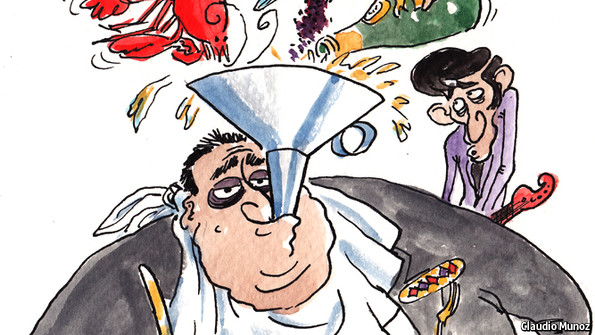
The age of the brunch reflects rising numbers of wealthy folk. “People used to entertain at home, but things have become less conservative—money does wonders,” says a catering manager at the Taj Mahal Palace Hotel, standing by a cheese the size of a car wheel. It also reflects a dearth of things for the well-to-do to do. Mumbai has little green space, few shops and dire transport. The rich would not be seen dead on the foreshore promenades where anglers cast for mullet on the weekends when the council does not release sewage into the sea, or on the beaches where whizzing cricket balls, rubbish and tens of thousands of paddlers vie for space.
Mumbai’s sports clubs, with British colonial roots, used to be the ticket. But they are now the preserve of the hereditary rich. The members’ noticeboard of the poshest of the lot, the Willingdon Club, reads like a Who’s Who of the city’s industrial dynasties. For newly minted entrepreneurs and professionals, that leaves hotels and restaurants. They are anyway better for showing off. Men flash Rolexes as they reach for the dim sum. Women assembling salads are got up in enough luxury labels to float the French economy.
The number of five-star hotels in Mumbai has risen even as the growth in foreign visitors has slowed with India’s economy. Occupancy rates have fallen to 50-60% across the city. This has led to a culinary arms race as hoteliers fight to attract locals. Sushi bars are standard—one hotel chain is said to have a daily supply flight from Tokyo. Dessert counters look like Willy Wonka fantasies, with chocolate fountains and giant revolving ice-cream vats. Playing on nostalgia, most buffet spreads feature posh versions of pani-puri, a street snack that slum-dwellers buy for a few rupees. Live music is essential. Wilburn D’costa, a long-established guitarist at Indigo, a restaurant, says “Hotel California” and “Viva Las Vegas” are the favourites.
It is unimaginable luxury for the millions of Mumbaikars below the poverty line. Yet most hotels admit they lose money on brunch, even with special deals from champagne-makers. For the rich, the problem is their waistlines. Ferried about by chauffeurs and absolved from household chores by servants, they have become a corpulent race apart from their skinny compatriots. Perhaps they need to invent a new institution: the Sunday afternoon walk.
Mumbai’s hungry high rollers: The wild brunch | The Economist
